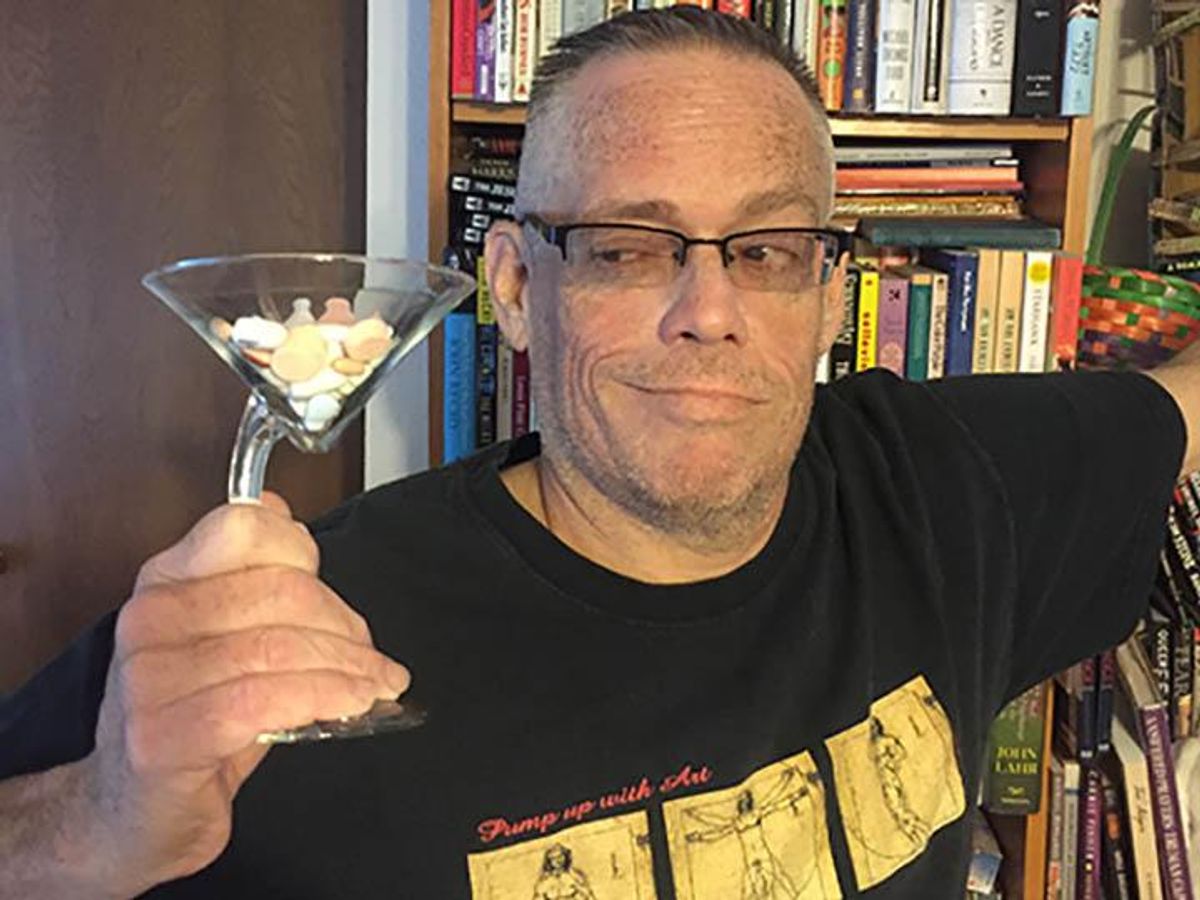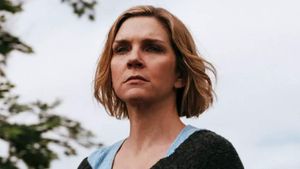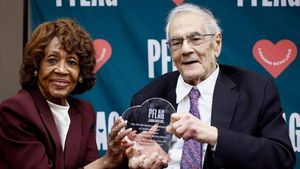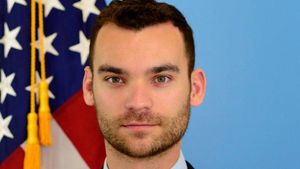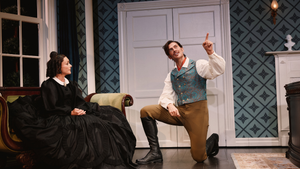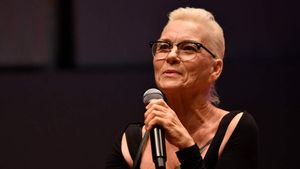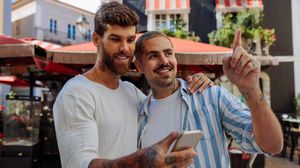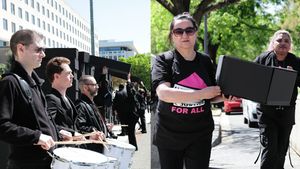Twenty years ago, Alan Andrews-Katz was incredibly ill, withered down to 116 pounds, and living in Bailey-Boushay House — America's first skilled nursing facility planned, funded, built, and staffed to meet the needs of people living with AIDS —where his doctors “kept telling me to make peace with the fact I was going to die, probably within weeks,” he remembers. He had cytomegalovirus, or CMV, an inflammation of eye that happens primarily to those with AIDS or other compromised immune systems.
He remained in the hospice for several months, often passing in and out of consciousness with almost no recollection of his stay. “I decided since I was going to die anyway, I would allow them to try a new drug on the CMV with the hopes that what they learned would help someone else in the future,” he recalls. The drug saved his life, but CVM left Andrews-Katz completely blind in his left eye. “I can't catch a ball for shit,” he says now. “And [I] am prone to running into things on my left side.”
The life-saving drugs also had an unfortunate side-effect: “that medication killed my kidneys,” he says. Rather than sending the already ill man into a spiral of depression, the kidney failure spurred him to go in new direction. Andrews-Katz soon began leading classes through a volunteer hospital program in which he helped other kidney failure patients cope with their own move to dialysis or transplant.
“Better to stay busy than to wallow in self-pity,” he quips today.
“Being so close to darkness has made Alan appreciate every aspect around him,” says Eric Andrews-Katz, Alan’s husband of 16 years. “He has adapted — sometimes to a detriment — a Pollyanna attitude towards life, with a touch of realism lurking on the edges.”
The couple now lives in Shoreline, Washington, outside Seattle, where they host annual dinner parties to raise money for people living with HIV and LGBT youth.
“It started as a riff on the Dine Out for Life,” says Andrews-Katz. “Every year, we organized our friends going out. It got to be us trying to organize for 15-20 people. Of course, there was never pleasing everyone with the restaurant and invariably we would be left picking up the slack on the bill. Finally, I thought, we could have a potluck, ask for donations, and donate all of the proceeds. We would cover the main courses and everyone else would bring the other dishes.”
While Eric organizes the invites and mailings, Andrews-Katz, a trained chef, does all the cooking. They ask people to donate $10 a person minimum.
“That first year, we had about 18 people in our home. We've now done it for 11 years. By the fourth year it had gotten too big for our home, so we procured alternate space at a local senior center. The largest year, we had about 75 people.”
They just hosted their eleventh annual event earlier this month. “Donations are still coming in, but we will end over $11,000 — 100 percent of which goes to Lambert House,” says Andrews-Katz. “We originally had been partnered with Rosehedge, a AIDS treatment facility for people living with mental health and/or substance issues as well, however they closed three years ago.”
At that time, the men decided to partner with Lambert House, an LGBT youth services group with a drop-in center that Andrews-Katz says he benefited from as a teen. In total, they’ve raised over $85,000. “Not bad for one night a year for 11 years,” he adds.
An advocate for medical marijuana, Andrews-Katz was vocal during the push to legalize it in Washington state. “Two of my ongoing battles are with appetite and insomnia,” he explains. “Yes, I could take pills to address both issues, but when you're already taking 30-plus pills a day, you start looking for any way not to take any more. I use an indica strain of marijuana to address both the sleep and appetite issues. I'm all for pharmaceuticals — goodness knows they saved my life — but marijuana has amazing effects for a wide spectrum of things, it’s a natural product, and the side effects are giggling, munchies, and sleeping.”
Now 50, Andrews-Katz has been HIV-positive for 33 years, enough time to have some serious side effects from being poz. Living with kidney failure means he must rely on dialysate and a machine to keep himself alive. With dialysis, he says, there is no such thing as spur of the moment travel; everything must be planned weeks in advance. His bloodwork must be monitored constantly, meds adjusted frequently, and he must watch what he eats and drinks.
“Every time I open my catheter, I run the risk of infection,” he admits. “I've had a few peritoneal infections over the 12 years I've been on dialysis. The last time was just two weeks ago. It's excruciatingly painful. One episode landed me in the hospital for nine days on morphine. Your life also centers around your machine if you perform it at home. I am connected to my machine for nine-and-a-half hours a night. The tubing has some length, so I'm able to walk around the room, but my leash is 25 feet.”
Andrews-Katz says the fact that many young gay and bisexual men no longer fear HIV, treating it as no big deal, in all honesty, “pisses me off."
"For a long time, I've wanted to run an ad series featuring people who are poz and have been dealing with some serious crap showing themselves. For instance, mine would be me in underwear so people could see how my body has changed, the catheter hanging out of my abdomen, ideally with the light angled right so the cataract in my left eye is evident. The only props would be a table with a martini glass overflowing with the pills I take during the course of a week. In the course of 7 days, that's about 210 pills.”
The Centers for Disease Control and Preventions' graphic anti-smoking ad campaign seems to be working by showing people who’ve lost jaw bones, their legs or part of their brains to the effects of cigarettes — so maybe similar ads would work around HIV.
“When the only people you see in HIV medication ads look like they just got out of the gym, you don't really think about how serious this is,” he adds. “I want to see the ad with me trapped at home because I can't leave the house for fear I'm going to crap my pants if I'm more than 10 feet from a toilet!”
Still, Andrews-Katz insists he’s not angry or regretful. He doesn’t want to be cliché, but admits, he doesn’t sweat the small stuff. “My husband would argue that I don't sweat the large stuff,” he adds, laughing. “Life is short. I don't see the need to be pissed off at what really are minor annoyances. Of course I get annoyed, but I get over things very quickly if I let them bother me.”
After growing up in poverty in Port Gamble, Wash., a town of about 124 people at the time, Andrews-Katz thought he’d open up a coffee shop filled with his signature baked goods. He put himself through the Culinary School of the Rockies and still bakes amazing macaroons. But living with AIDS for decades has changed the trajectory of his life.
“I've noticed a certain amount of narrowing to my life,” he notes. “My energy tends to be fairly limiting. I generally have to pick what I'm going to do for the day. Because of this, I don't get to see people as often or do as many things as I would like to. As time has gone on, especially as I've been on disability or working from home, I see fewer and fewer people. I try to get out and just be in the world, but there are days that's physically not possible.”
He says he’s been lucky to work from home, he says. “It's doubtful I'll ever be able to hold a job outside of the home again.” Still, he’s a survivor.
After all, he says, he was prepared to die by the time he hit 30. “All of a sudden I now have to deal with things I never thought I would,” Andrews-Katz admits. “I was so sure AIDS was going to kill me that it was a total surprise when I had a heart attack. You also tend to lose objectivity. I mentioned I had a peritoneal infection two weeks ago. I should have been in the hospital, but I chose not to go because I thought it wasn't that bad. As one of my friends put it, ‘Maybe you've been through such horrific things that you can no longer tell what's ‘not that bad.’” (Andrews-Katz calls that “food for thought.”)
“It is rare to know someone that has been through so much and yet, still manages to keep such a bright disposition,” his husband says.
But Andrews-Katz sees life a bit differently, acknowledging, “My definition of success has changed as well. Like a lot of us, I was driven by money and what it could do for me. Now, I look at success by the people who are in my life. I have a lot of great people in my life who I love and who love me; I'm a very rich man.”
